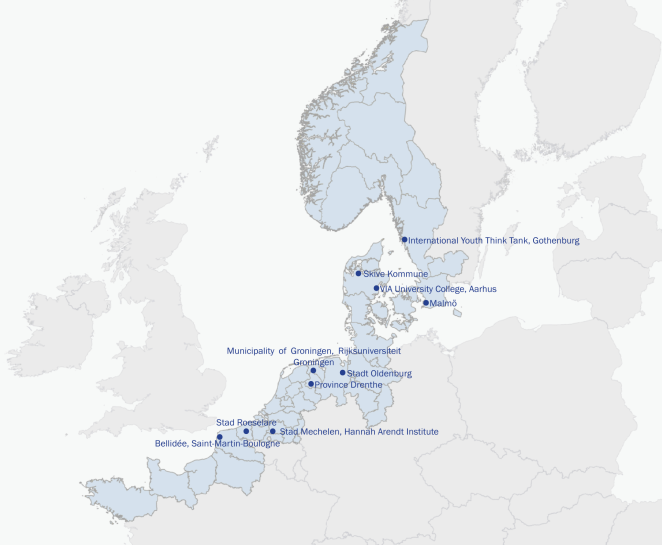
Speak Up is a collaboration of 12 partners across 6 countries.
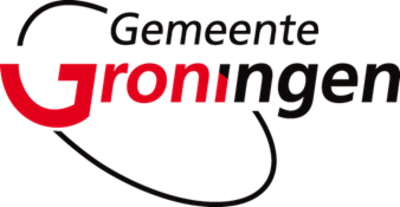
Municipality of Groningen
The municipality of Groningen is, in terms of population (238,016 inhabitants in 2023), the fifth largest municipality in the Netherlands and by far the largest in northern Netherlands. The municipality is centered around the capital city Groningen of the province Groningen. The municipality consists of 21 hubs (one of which is a city) with a total area of 180 km². The municipality has an urban area and more rural areas at the edges. The city has many students and is the youngest city in the Netherlands with an average age of 36.4 years. The municipality collaborates with knowledge and research institutes on shaping the future in the areas of energy, health, food, and digitalization.
Since 2014, the municipality has been working on a district-oriented approach with district aldermen and district teams. Groningen is divided into 7 areas and 14 neighborhoods, which are further divided into 106 neighborhoods (with many sub-neighborhoods). The municipality has years of experience with participation. In the Groningen model for neighborhood and village democracy, various democratic experiments have been merged to give residents more influence and control. With the Voice of Groningen, we are working on online participation. In the coming period, attention will be paid to learning from participation so that it is better integrated into the municipal organization. Groningen is currently working on an overarching participation policy and regulation prescribed by legislation.
Contact points:
Renske Stumpel
Renske.Stumpel@groningen.nl
+31652166835
Marjon de Bie – Weidgraaf
marjon.de.bie@groningen.nl
+316 21885099
Fred Stol
Fred.stol@groningen.nl
+316 425042542
Postbus 30026
9700 RM Groningen
The Netherlands
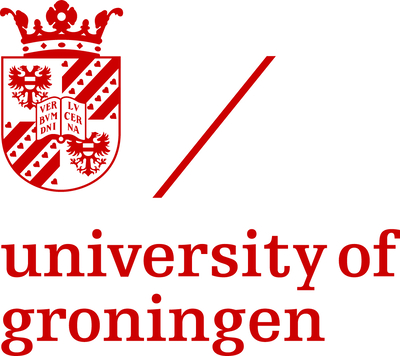
University of Groningen
The University of Groningen (UG) is the third largest (30,000 students) university in the Netherlands and has a ‘Top 100’ ranking in the World University Rankings. One of the four university’s research priorities is sustainable development, with democracy and governance as a key focus.
The current project will be conducted by the social and environmental psychology lab groups, which are internationally recognized as major expertise centres (currently over 50 PhDs & 25 senior researchers). They achieve scientific and societal impact through building communities and bridges between researchers, practitioners, and students on major themes such as inclusion and diversity, social change and polarization, communication and cooperation, sustainable behaviours and public acceptability of climate policies and system changes. Beyond generating high-quality academic publications, they also stimulate public engagement efforts, and efforts to develop and evaluate existing interventions and policy.
Contact point:
Namkje Koudenburg
n.koudenburg@rug.nl
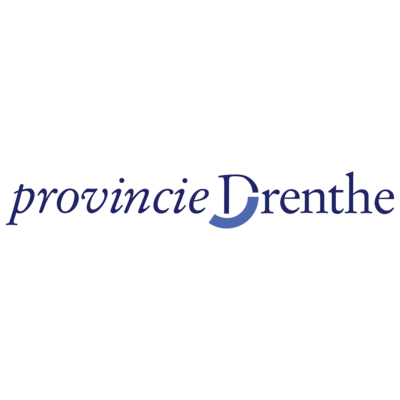
Province of Drenthe
The Parliament of Drenthe, has worked on improving its connection with citizens fr over six years now. The Parliament unanimously adopted a vision in which the they aim to better represent all residents of Drenthe, including those who do not feel connected to politics. Projects aimed at reaching out to all groups in society have been set up. E.g.: formal access to talk to parliament has become more accessible and informal ways of communication were created. Groups have been invited to the parliament and debates have been organised with residents. A study on what role the parliament can play when it joins initiatives in society as a responsive government was also held. The parliament has her own survey panel with nearly 7,000 residents to whom surveys can be submitted. Based on the panel, a framework on ‘connected governance’ was developed to use when drafting new policy. The framework describes who has which role in citizen engagement during the phases of policy making.
Contact points:
Emma Jasperse
e.jasperse@drentsparlement.nl
Anne de Zeeuw
a.dezeeuw@drentsparlement.nl

Stad Mechelen
The city of Mechelen is located between the nearby bigger cities Antwerp and the capital of Belgium/Europe Brussels. The connectivity of this medium-sized city (87.000 inhabitants) brings in the dynamcs of a big city on a relatively small, clear scale. A historic city, sur-ounded by green villages.
More than 130 nationalities live together in this vibrant, multicultural city. Together we speak more than 80 different languages. More than half of the children born in Mechelen have a migrant background.
In the last decades the City of Mechelen has done everything in its power to become a city for everyone, an inclusive city. Our organization and services are tailored to the superdiverse Mechelaar, breaking through segregation, developing equal opportunities, fighting discrimination and strengthening social mobility. Connection, inclusion, equal opportunities and participation are key terms in strategical en operational planning, in tackling complex challenges like climate change.
Contact Point:
Mark Van der Veken
mark.vanderveken@mechelen.be
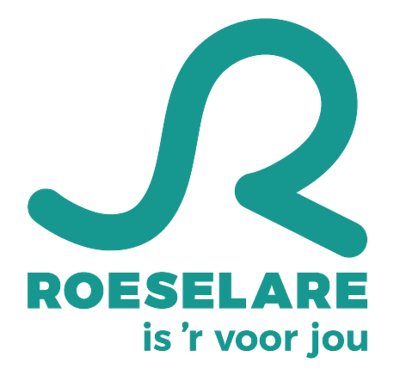
Stad Roeselare
Roeselare is a medium sized city in the west of Belgium in the region of Flanders with about 65.000 inhabitants. Roeselare has been working on citizen engagement for several years and has set up various projects regarding this policy topic. The City also has a policy officer working on dialogue and citizen’s engagement, who coordinates different participatory projects such as citizen’s budgets and who tries to roll out an integrated approach on participation. The city has several structural dialogues with citizens and citizen associations on the one hand but also engages them project-based. Furthermore, Roeselare involves its citizens by the development and evaluation of its public services by organizing citizen panels. Besides the City also works with the "ownership" model where groups of engaged citizens work on further advancing development of a domain such as in the so-called climate coalition or smart city community.
Contact Point:
Jasmien Wellens
strategischecel@roeselare.be
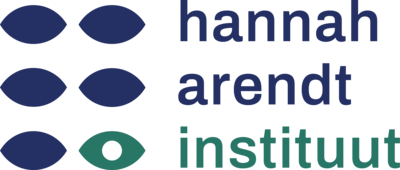
Hannah Arendt Insituut
The Hannah Arendt Institute is a partnership between the 5 Flemish and Brussels universities in Belgium. Our Institute aims to bring scientific insights to policy makers, professionals and citizens. We do this around three broad pillars: citizenship, urbanity and diversity. Within those 3 pillars, ‘Democracy and citizenship’ is one of our priority theme around which we develop expertise and project experience. As a hub organization between the universities and the field of practice, we want to build a bridge between scientific insights and practice around this theme. The core business of our organization is to make scientific insights as useful as possible for practice. We therefore engage in projects, training programs and events in which science valorisation is central. We have expertise in science communication and the development of useful and science-based tools.
Contact point:
Landry Mawungu
Landry.mawungu@hannah-arendt.institute
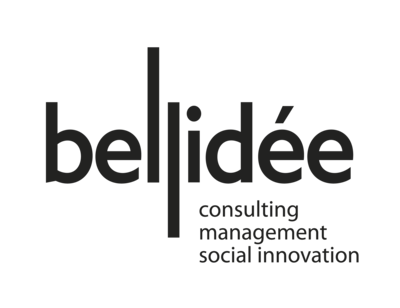
Bellidée
Bellidée is a French NGO in North of France. It aims to share values of solidarity, democracy and human dignity. It manages 3 community centers. They provide social link and improve the living together in the neighborhoods of Saint-Martin-Boulogne (11.000 inhabitants).
Contact points:
Yacine Diallo Gaujot
europe@bellidee.fr
Eric Martin
direction@bellidee.fr

VIA University College, Aarhus
Website VIA University College
Skive Kommune
Skive Municipality is situated in the Limfjord region of northwest Denmark within the Central Denmark Region. The municipality is home to around 46,000 residents primarily residing in the urban center of Skive city and 11 smaller towns. Skive Municipality is dedicated to achieving a well-balanced integration of urban and rural areas to create appealing environments with a high quality of life and thriving local communities.
Skive Municipality has a history of active engagement in energy, climate, and sustainability dating back to the 1970s. Renowned for innovative green energy solutions based on circular principles, the objective is to achieve climate neutrality by 2050, as outlined in the municipality's comprehensive Climate Action Plan.
The municipality's current focus is on motivating citizens to reduce their carbon footprint. This involves promoting local green communities, facilitating increased dialogue and collaboration, and inspiring citizens to make more sustainable choices in their lives and behavior.
Within the municipality, the Business and Development Department, with 15 employees will be involved in the SPEAK-UP project. This department includes teams such as Energy City Skive and Rural Development, and focuses on recruiting residents, business development, and climate and sustainability initiatives. The municipality is committed to enabling citizens, volunteers, and stakeholders to play an active role in advancing the green transition and fostering the prosperity of rural communities within its boundaries.
Contact point:
Signe Bak Jørgensen
sibj@skivekommune.dk
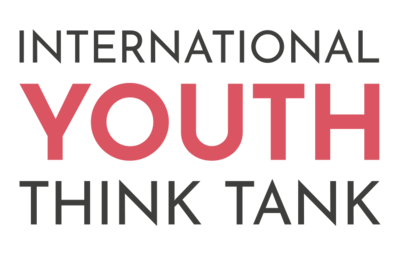
International Youth Think Tank
The IYTT was founded by Cecilia Malmström and Urban Strandberg in 2019. It is a think tank in which young people conduct democracy-strengthening activities with the aim of inspiring decision-makers to democratic renewal and people in general to become more active citizens. Youth are recruited via open calls for annual four-day conferences with 24 participants aged 18–24. The conferences serve as an entry ticket for continued involvement as a Youth Fellow. To inspire decision-makers, Youth Fellows develop democracy-renewing proposals that are published in a user-friendly democracy handbook, in reports, in working papers and in policy briefs. To inspire people to active citizenship, Youth Fellows go out on the town and talk to passers-by using a method they developed themselves, called Open Chair Democracy Talks (OCDT). Since its inception in Athens in September 2021, Youth Fellows have conducted OCDT's in over 50 locations on four continents. The international impact of the think tank is exemplified by an article in The New York Times in October 2022 and by the fact that applications for the five-year anniversary conference in 2023 came from 540 young people from 68 countries.
Contact point:
Urban Strandberg
Managing Director
urban.strandberg@lindholmen.se
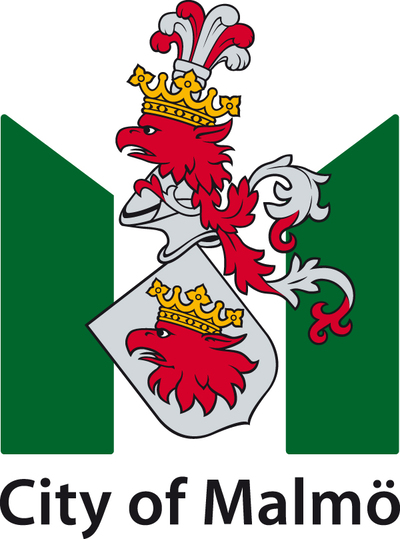
Malmö
Sweden’s third largest city, Malmö is located on the south-western tip of the country and has a direct link to Denmark and the European continent via the Öresund bridge. The city’s inhabitants (approximately 350 000) come from around 180 countries and speak some 150 different languages. Malmö has a young population, nearly half of which is under the age of 35. Malmö aspires to be a sustainable city – socially, economically and environmentally.
Participation and inclusion are at the centre of the city’s approach to address climate transition and a sustainable lifestyle through citizen involvement. The residents in Malmö are considered key actors in “Climate Transition Malmö”, the City of Malmö's collaborative effort to mobilize businesses, academia, associations, and residents to collectively address the city's climate challenges. The initiative focuses on developing knowledge, methods, and forms of collaboration that can accelerate the transition towards a sustainable Malmö. The work is based on leading research and analyzes of how we can most effectively achieve our climate goals while creating more societal benefits such as a better living environment and more jobs. Climate Transition Malmö is part of the implementation of the City of Malmö's environmental programme and is based on the City Council's goal that Malmö should be a forerunner in climate work and contribute to the Paris Agreement's 1.5-degree goal.
Contact point:
Monika Månsson
monika.mansson@malmo.se

Stadt Oldenburg
Oldenburg is a modern and growing city with a tremendous quality of life and more than 170,000 inhabitants. Irrespective of whether you want to enjoy Oldenburg as a tourist, come as a student or plan to live and work in our beautiful city – you are always welcome!
We invest in new housing, more places in daycare centres and, of course, in a necessary infrastructure with streets, educational institutions or the prerequisites for the digital future. All the above-mentioned points are important conditions for participation in events and life in our city.
For many years, these topics have been the focus of my work and successes are visible in many places. At the moment, numerous flats and houses are built in all districts of Oldenburg. Since 2014, we have invested more than 130 million euros in care facilities. Other objectives of our work are a good cultural and educational offer as well as a strong commitment to climate protection.
In our new neighbourhoods, the residents take centre stage. Modern technology must offer them added value. That is why residents are directly involved in the development processes. Communal areas and spaces ensure a lively neighbourhood.Our vision is for all Oldenburg residents to have the opportunity to help shape the future of our city. That is why we do not see participation as a static process, but as one that is constantly adapting to social changes. Only in this way can we achieve participation for all, from which everyone benefits.
Contact point:
Katharina Meiners
Katharina.meiners@stadt-oldenburg
